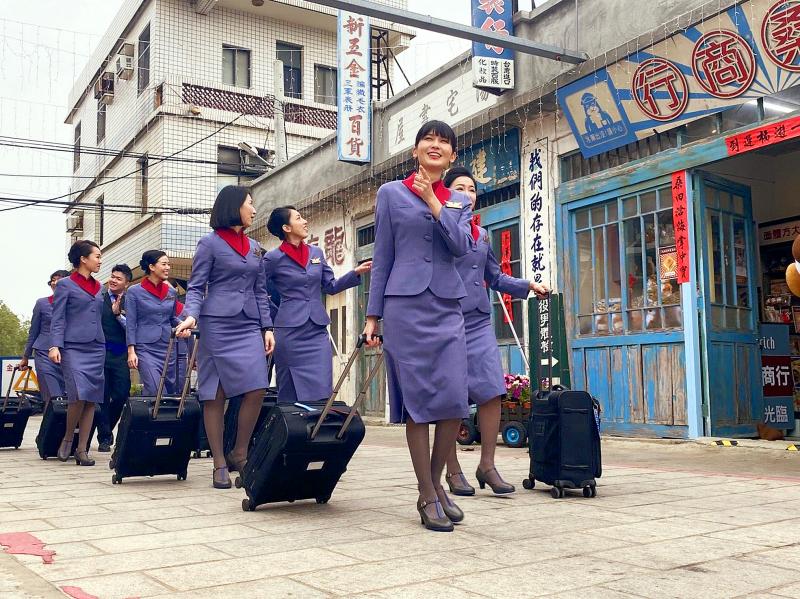Nearly 99 percent of aircrew members working on long-haul international flights at Taiwan’s two largest airlines have been fully vaccinated against COVID-19, the Civil Aeronautics Administration (CAA) said yesterday.
Of the 10,222 pilots and flight attendants at China Airlines Ltd and EVA Airways, 9,131 work on long-haul international flights, with 9,015 of them having received a second dose of a COVID-19 vaccine by Monday, CAA data showed.
The remaining 116 pilots and flight attendants have refused to be vaccinated against COVID-19 for various reasons, from personal health issues to insistence on a specific vaccine brand or a mix of brands, Flight Standards Division Director Wu Chia-jen (吳家珍) said.

Photo: Wu Cheng-ting, Taipei Times
Twenty-two of them have yet to receive their first vaccine dose, he said, adding that they would be required to follow disease prevention regulations stipulated by the Central Epidemic Command Center (CECC).
The agency helped the two airlines get their cabin crew members vaccinated as Minister of Transportation and Communications Wang Kwo-tsai (王國材) instructed last week, Wu added.
Except for those declining to be inoculated, China Airlines completed aircrew vaccinations on Thursday last week, while EVA Air is expected to finish by Friday.
Long-haul crew members who are fully vaccinated and test positive for antibodies must quarantine for five days and follow stricter health management guidelines for another nine days upon completing their flight duties, the center said.
Those who have yet to be vaccinated or have only received one dose must quarantine for seven days and follow stricter health-management guidelines for seven days, it added.
Crew members returning from the UK, India, Indonesia, Israel, Myanmar and other nations with a high risk for contracting COVID-19 must quarantine for 14 days, the center said.
“We are aware of discussion about whether pilots and flight attendants should get a booster shot, given the health risks involved in their line of work — we would defer the issue to the CECC and follow its instructions,” Wu said.

A decision to describe a Chinese Ministry of Foreign Affairs statement on Singapore’s Taiwan policy as “erroneous” was made because the city-state has its own “one China policy” and has not followed Beijing’s “one China principle,” Deputy Minister of Foreign Affairs Tien Chung-kwang (田中光) said yesterday. It has been a longstanding practice for the People’s Republic of China (PRC) to speak on other countries’ behalf concerning Taiwan, Tien said. The latest example was a statement issued by the PRC after a meeting between Singaporean Prime Minister Lawrence Wong (黃循財) and Chinese President Xi Jinping (習近平) on the sidelines of the APEC summit

Taiwan’s passport ranked 34th in the world, with access to 141 visa-free destinations, according to the latest update to the Henley Passport Index released today. The index put together by Henley & Partners ranks 199 passports globally based on the number of destinations holders can access without a visa out of 227, and is updated monthly. The 141 visa-free destinations for Taiwanese passport holders are a slight decrease from last year, when holders had access to 145 destinations. Botswana and Columbia are among the countries that have recently ended visa-free status for Taiwanese after “bowing to pressure from the Chinese government,” the Ministry

‘SIGN OF DANGER’: Beijing has never directly named Taiwanese leaders before, so China is saying that its actions are aimed at the DPP, a foundation official said National Security Bureau (NSB) Director-General Tsai Ming-yen (蔡明彥) yesterday accused Beijing of spreading propaganda, saying that Chinese President Xi Jinping (習近平) had singled out President William Lai (賴清德) in his meeting with US President Joe Biden when talking about those whose “true nature” seek Taiwanese independence. The Biden-Xi meeting took place on the sidelines of the APEC summit in Peru on Saturday. “If the US cares about maintaining peace across the Taiwan Strait, it is crucial that it sees clearly the true nature of Lai and the ruling Democratic Progressive Party (DPP) in seeking Taiwanese independence, handles the Taiwan question with extra

HEALTHCARE: Following a 2022 Constitutional Court ruling, Taiwanese traveling overseas for six months would no longer be able to suspend their insurance Measures allowing people to suspend National Health Insurance (NHI) services if they plan to leave the country for six months would be abolished starting Dec. 23, NHIA Director-General Shih Chung-liang (石崇良) said yesterday. The decision followed the Constitutional Court’s ruling in 2022 that the regulation was unconstitutional and that it would invalidate the regulation automatically unless the NHIA amended it to conform with the Constitution. The agency would amend the regulations to remove the articles and sections that allow the suspension of NHI services, and also introduce provisional clauses for those who suspended their NHI services before Dec. 23, Shih said. According to